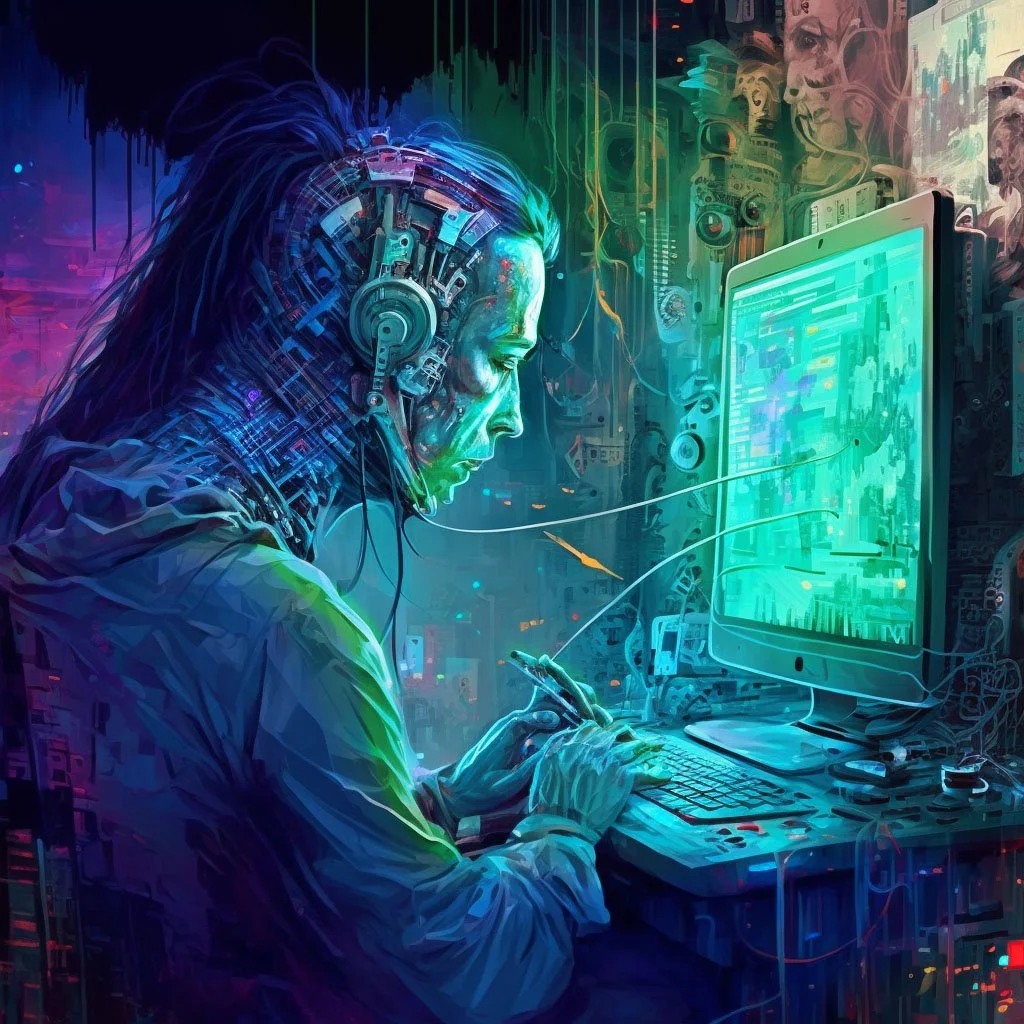AI learning and copyright.
The Artist and AI as one.
As creatives we are in the midst of adjusting to a revolution in art creation. Artificial Intelligence or AI powered tools are re-defining how with think about image creation, the ramifications of this new technology, our creative processes and the impact on the wider arts.
A recurring concern of many artists surrounds the use of AI algorithms learning from their copyrighted images. More specifically the potential for the algorithm to produce new works that infringe on the copyright of the original images and therefor the originating artists. This can potentially happen because the AI algorithm may unintentionally create a new work that is substantially similar to the copyrighted images it was trained on.
The phrase ‘substantially similar’ is the key point here. Copyright law already protects artwork if a new work is ‘substantially similar’ to another artists work and so an AI work would likely fall foul of the same law. I suspect that the real fear here is that the AI art algorithms can adopt the style of any give artist if it were to be trained on enough artworks from the same artist. The conversation around an image being a substantially similar style is a far more subjective problem and as such cannot be effectively governed by copyright law.
Another concern are the ethical implications of using copyrighted images to train AI algorithms in the first instance. If an AI algorithm trained using ‘random’ copyright material is used to create new works, the original creators of the copyrighted images are very likely not going to receive proper credit or compensation for their contributions. In fact the originating artists are very likely to be completely unaware that their images were ‘scraped’ by the AI authors in the teaching process.
Discourse around this point of AI is important but to my mind there is a direct correlation to the AI learning and that of the learning path of any artist. As a creative I can say with certainty that my art has been ‘influenced’ by many artists and artworks over the years and I am sure that there is very little chance that any one of those artists would be able to seek reparations from me for ‘copying’ them. We all stand on the shoulders of giants and so does the AI.
Another concern centres around the potential for AI algorithms to perpetuate biases and stereotypes that may be present in the copyrighted images used to train them. This could very well lead to the creation of biased or discriminatory works. For me this is only likely to be of concern if the output from the AI is automatically ‘used’ or published. While the output from AI is filtered by a person before use then the onus of moderation falls onto that person so biased or discriminatory works are unlikely to make the light of day.
One interesting thought for AI developers - in a couple of years from now, what happens to the AI algorithms if they start to learn from their own output? As the internet fills with gazillions of AI generated images all tagged with the keywords that created them, what will be the impact of 2nd, 3rd, 4th order learning? Interesting …
Overall, it is important for those using AI algorithms to carefully consider the ramifications of using AI. We all need to understand our own views and develop an internal narrative that defines what we are comfortable with and what we are not.
Like all seismic technology shifts in our recent human history, AI will change the world as we know it but it is worth remembering that this same process follows other groundbreaking inventions. Think of the wheel, printing press, steam engine, internal combustion engine, telephone, satellites, television, computer, internet, 3D printer and the quantum computer amongst many others. Is the AI revolution any different?
It should never be about stifling the new technology … it should be about adapting to life with the new technology and learning to mould our life around it. AI is simply a revolutionary new tool.
My personal love of AI tools stems from my ability to explore far more artistic directions in a fraction of the time it took previously. Ai is a tool the same as a paintbrush or Photoshop. The difference with AI is that it collaborates on the actual creative process, not simply assisting the rendition of your creativity. Like all tools, your relationship with the tool is a collaboration and AI is no different.
In my experience, good artists produce far better images using AI than untrained artists using AI because artists are trained and experienced in making better artistic judgements and changes. Like all new tools one can choose to ignore them or adapt to use them. A word of caution though, if we fail to positively learn and adapt to our environment then we run the risk of being left behind in the great cycle of evolution.
A good artist will always be a good artist, but any true artist correctly using AI could be very much better!
[JVN]
